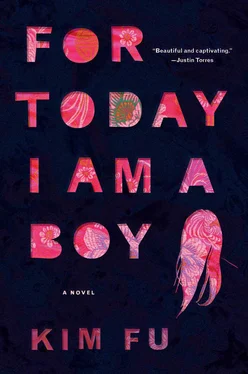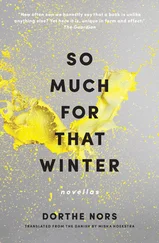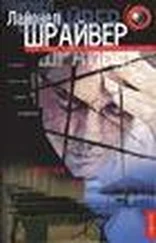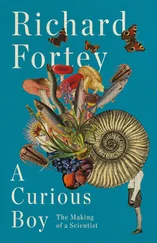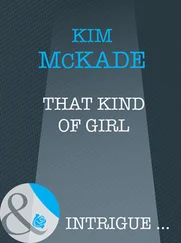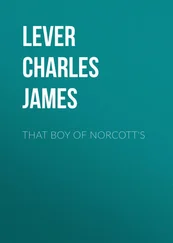I sat down, defeated, putting my butt squarely in the mud.
Helen stopped in front of me. She looked at the shovel. She looked at my tired face, my stained clothes. At the dirty, still-sealed box now with only the Aw of Away legible. She watched the box tensely, as though it were a wound-up jack-in-the-box.
She knelt down. Mud and water got into her sandals. With both arms, she thrust the box into the stream.
The box sank down with a sucking blomp, then bobbed up again. Only the top was visible, like an iceberg. The box moved leisurely with the current. When it struck the rocks along the bank slightly farther down, not very hard, the tape came loose from the sodden cardboard. The flaps popped open.
Helen and I watched as Adele’s possessions flowed away and the box buoyed more and more easily to the surface. Glossy paperback covers jumped like iridescent fish. A coveted leather jacket floated on its inner lining, looking like an eel, sleek and menacing. Everything migrated slowly downstream.
I felt numb, more conscious of the wet seat of my pants than anything else. Helen extended her hand to me. I took it and she pulled me up. We walked back to the house. At the back door, Helen took off her sandals and wiped her bare feet on the mat. She lined up her shoes neatly. I kicked my sneakers off and left them where they landed.
Adele was standing with her boxes and suitcases by the front door. She paced a small circle. The house still had the anticipatory air that it had when my parents were sleeping, their authority latent. Adele’s face — eyebrows knit in confusion, not accusation — made me realize what we’d done. I started to cry.
Adele opened her arms and I rushed for her knees. “I just wanted you to stay,” I mumbled, muffled by the bottom of her nightshirt. Even then, I knew my eight-year-old tears were crocodilian. I knew what I was saying: I don’t care if you’re happy, as long as you’re here.
I could feel Adele and Helen meeting eyes over my head. Helen stayed a safe distance away from our embrace, her head held high and her stare blank.
Adele’s stuff washed up on the riverbank a day later. Someone phoned the police, thinking there had been a drowning, that all those clothes implied a body. It was in the local paper.
Another family would have reported what had actually happened, saved the town from speculation. Ours ignored it. The explanation was too complicated, too private. I had guilty nightmares. In my dreams, policemen stood at the edge of the river, carefully skimming the water with butterfly nets. They moved as gingerly as archaeologists, gathering pieces of a teenage girl’s life. They ignored their radio and the screams of real crimes.
Adele went to study at the University of Western Ontario, in another Ontario town that sprawled through strip malls and industrial lands, hardly different from the one she’d started in. Helen left a year later. She went to UCLA on a cocktail of scholarships and bursaries that just covered her first year.
On a weekend, she drove by herself to Santa Monica. She bought a sandwich and sat on the Venice Beach boardwalk, laughing reedily at artists hawking sketches, musicians in the costumes of their subcultures thrusting tapes at passersby, the deluded parade of people who thought they’d make it one day. Helen went to California like a gold-rush miner, expecting to find a place where dreamers were ground underfoot by the hard-working, the wise. She would return wearing a suit of gold or she wouldn’t return at all.
We drove as a family to drop Adele off at the bus station. The buses picked up from a long strip like an airfield. She wore impractical traveling clothes: high heels and a cinched blazer, both in electric blue. Her hourglass figure shimmied away with the distinct ticktock of her shoes on the asphalt. Bonnie and I held hands as we watched her go. We were the same height, had the same baby plumpness, the same sweaty palms. At a certain point, we couldn’t tell if Adele was walking toward us or away.
I have no memory of Helen’s leaving. If it was by plane, train, or bus. If we said goodbye. I have only memories of events that took place before she left and memories of events that took place after. It was as though when she left, she vanished in the night, unnoticed.
EVERY DAY BUT THURSDAY, Bonnie and I came straight home from school. We did our homework at the kitchen table. Bonnie turned my threes into birds and sideways pairs of breasts. I watched the back of our mother as she shelled shrimp in the sink, her spine rigid and visible through a cotton shift. She inhaled sharply as she cut her finger on a spiky leg. She lifted her finger high enough for me to see the drop of red falling into the bowl of naked shrimp, and then she went on. Their briny gray juices got into her wound, and she went on. We would eat her blood for dinner.
The doorbell rang. My mother jumped as though slapped awake. She went to open the door. “Yes?”
Bonnie climbed over me to see who it was, and I followed. We strained to see past our mother.
The woman at the door was pale and thin and seemed to quiver at the edges, like she was made of water. She had limp red hair. Her freckles were a handful of sand tossed in her face. “Hi,” she said. “I’m Lisa Becker. I live down the block.”
My mother stayed mostly behind the door. “Did you just move in?”
“No, we’ve lived here for a few years.”
“What do you want?”
“Well, I, uh…” Mrs. Becker seemed to have forgotten why she had come. She glanced around for an explanation. Her gaze landed on the plastic box in her hands. “Oh, right. I heard you had a little boy and girl. I had some toys we don’t need, so I thought I’d give them to you.” She opened the container: a rag doll and some toy cars.
“My son is fourteen and my daughter is thirteen. But thank you.” My mother started to close the door. Something in Mrs. Becker’s face stopped her. “How old are your children?”
“I don’t have any children.” She moved her head and hands constantly, like a bird, and it made it hard to concentrate on what she was saying. “I had a miscarriage a few years ago and my mother had already bought me the toys. You know — whether it was a boy or girl, we’d be ready.” She closed the container. “I guess they would have been more useful to you back then.”
I couldn’t see my mother’s face, but I could feel the distaste radiating off her back. What kind of woman talks about miscarriages at a stranger’s front door? “Thank you for the offer, Mrs. Becker.”
If my mother breathed out too hard, Mrs. Becker would blow away like a plastic bag. “No problem, Mrs. Huang.” She started down the front steps. She was wearing white sneakers, the same discount-store brand as my mother.
“How did she know our name?” Bonnie asked.
“Who cares,” Mother said, going back to the sink.
Bonnie was born fourteen months after me, more like a twin than a younger sister. When she was twelve and I was thirteen, she stole a pair of earrings from a friend’s house. She walked into the jewelry store of the nearest mall and tried to sell them. The clerk called the cops. Bonnie told them she had taken it from her own mother’s jewelry box. The cop called our house.
I was home. I hated answering the phone, so I stood by the machine and listened to the long, grave message. The moment he hung up my hand shot out and hit the Delete button.
Bonnie was delivered home. She didn’t learn any of the things the cops had intended to teach her. She learned to go to pawnshops downtown, wear heels, not look twelve.
When Bonnie was five and I was six, we popped out of our shared gray bathwater and went into the kitchen. It was exam season, when Adele claimed to be studying at the library in the afternoons and Helen actually was. Our mother, hiding from us in the bedroom, had left dinner to simmer. Bonnie wet her hands in the beet juices on the cutting board and convinced me to do the same. She reached back and squeezed her own buttocks, leaving a pink imprint of cupping hands. I grabbed the sides of her face. Magenta tribal paint. She pushed back on my shoulders, giggling.
Читать дальше
